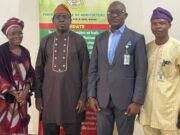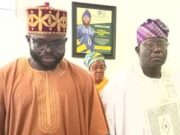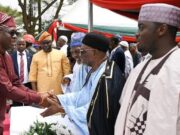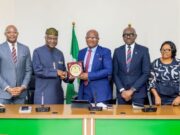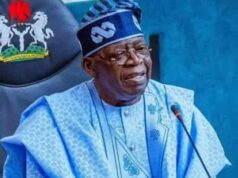The Senate on Wednesday passed two out of the four Tax Reforms Bills transmitted to it for approval last year by President Bola Ahmed Tinubu.
The passage of the bills followed the presentation of the report of the Senate Committee on Finance and the adoption of its recommendations by the Senate during plenary.
The Chairman of the Senate Committee on Finance, Senator Mohammed Sani Musa (APC – Niger East) presented the report.
The four Bills are: Joint Revenue Board (Establishment) Bill, 2025; Nigeria Revenue Service (Establishment) Bill, 2025; Nigeria Tax Administration Bill, 2025; and Nigeria Tax Bill, 2025.
However, the two Tax Reform Bills passed by the Senate are: the Nigeria Revenue Service (Establishment) Bill, 2025, and the Nigeria Tax Administration Bill, 2025.
The four Bills were referred to the Senate Committee on Finance for further legislative action after their second reading by the Senate on Thursday November 28, 2024.
The Bills had generated heated debate in the polity, thereby forcing the Senate to defer legislative work on them, including organising a public hearing.
However, following wide consultation by the Senate with critical stakeholders and the intervention of the Nigeria Governors’ Forum, the clauses containing the proposals for VAT collection and administration, which had generated a lot of criticism, were amended.
The recommendations of the NGF led to the continuation of legislative work on the Bills by the Senate after a long delay.
Among others, the Senate adopted the retention of the Value Added Tax at 7.5 per cent.
On the Nigeria Revenue Service (Establishment) Bill, 2025, the Senate adopted the recommendations of the committee, which states that, “The objectives of this Bill should be amended as follows:
“To provide for a legal, institutional, and regulatory framework for the administration of taxes and revenue accruable to the Government of the Federation, as prescribed by the National Assembly.
“Clause 4 of the Nigeria Revenue Service Establishment Bill 2025 – functions of the Nigeria Revenue Service should be amended as follows:
“Assess persons, including corporations, companies, and individuals chargeable with tax, other than individuals, resident in any state of the Federation or the Federal Capital Territory.
“In collaboration with the relevant Ministries and Agencies of Government, subject to the approval of the Senate, review the tax regimes and promote the use of taxation to develop, stimulate,e and grow economic activities;
“Adopt measures to identify, trace, freeze, confiscate or seize proceeds derived from tax fraud or evasion, in line with the provisions of this Bill;
“Clause 7 (1a) of the Nigeria Revenue Service Establishment Bill 2025 should be amended as follows:
‘The Chairman of the Board, who shall be the President; and (b) Executive Vice Chairman, who shall be the head of the Revenue Service and subject to confirmation of the Senate.’
“Clause 13 (2) of the Nigeria Revenue Service Establishment Bill 2025 should be amended as follows:
‘The Secretary shall be a lawyer, or a chartered accountant or a chartered secretary who shall not be less than the rank of a Deputy Director.’
“Executive directors should be appointed to the Board of the Service. We propose that the relevant clause be amended as follows:
“The President shall appoint six Executive Directors for the Service, each representing a geopolitical zone on a rotational basis among the states in the zone in alphabetical order, provided that the Executive Vice Chairman and an Executive Director shall not come from the same state.
“The timeline for reporting by the service should not exceed three months after the end of the preceding year.”
In addition, the Senate also adopted the recommendation of its Committee on Finance on the Nigeria Tax Administration Bill with the title: “A Bill for an Act to provide for the assessment, collection of, and accounting for revenue accruing to the Federation, Federal, States and Local Governments; prescribe the powers and functions of Tax authorities, and for related matters.”
The Senate adopted the recommendation on the sharing formula for VAT which states that,”(a) 10% (VAT) to the Federal Government; (b) 55% to the State Governments and the Federal Capital Territory; and (c) 35% to the Local Governments.
“The amount of VAT revenue standing to the credit of states and local governments shall be distributed among them on the following basis: (a) State Governments: (i) Equality – 50%, (ii) Population – 20% and (iii) Place of consumption – 30%; (b) Local Governments (i) Equality – 70% and (ii) Population – 30%.
“Change the word ‘derivation’ to ‘place of consumption’ to provide clarity.
“Penalties for the following offences were amended as follows: Failure to register: (a) N100,000.00 in the first month in which the failure occurs; and (b) N50,000.00 for each subsequent month in which the failure continues.
“Failure to file returns: (a) N200,000.00 in the first month in which the failure occurs, and (b) N50,000.00 for each subsequent month in which the failure continues
“Failure to keep books: On request by the relevant tax authority, fails to provide any record or book prescribed in this Act shall be liable to pay an administrative penalty of (i) in the case of a person other than a company, N10,000.00, and (ii) in the case of a company, NI00,000.00.
“Failure to remit tax deducted at source or self-account: A person who fails to comply with subsections (1) and (2), shall, on conviction for any of the offences under this section, in addition to the administrative penalty, be liable to a term of imprisonment not exceeding three years.”
Senate President Godswill Akpabio who presided at plenary, commended his colleagues for painstaking job and for staying till about 5.30pm to consider the two Bills.
He said the Senate would consider and pass the remaining Bill which include the Joint Revenue Board (Establishment) Bill, 2025 and the Nigeria Tax Bill, 2025.
In his remarks during the consideration of the report on the Bills, the Deputy President of the Senate, Senator Barau Jibrin, during the consideration of the report of the Senate Committee on Finance, commended the Senate for passing the Bills despite the disagreements that greeted their introduction at the onset.
Barau said: “It is time to congratulate the entire Senate and in particular the Committee on Finance and the Elders Committee for the wisdom and leadership that has been shown in these bills. Initially, there were disagreements and there were rancors here and there.
“But the Senate, standing on its position as the highest assembly in the land, decided to establish this committee, the Special Committee to look at all those areas of contention and hear the views of religious leaders, regional organisations, and other stakeholders.
“Now, thank God, the committee, also in its wisdom, sat with all, had a very robust public hearing, and got to where we are now. And thank God, all these areas have been resolved.
“This is the beauty of democracy. I’m proud to be a member of this Senate for the maturity that has been shown in dealing with this matter. Now, today, we are all on the same pedestal, agreeing on this issue. Religious leaders, NGOs, Nigerian Governors Forum, and the rest. Now we are on the same page.
“I congratulate all of us, particularly the Special Committee. You have done a wonderful job. I’m proud of you. I’m proud of the leadership for exhibiting the wisdom to set up this committee in the first place.”
Credit: thenationonlineng.net











